Tips for Product Management Interview PreparationI could fill up a book with awkward questions and statements that I’ve encountered while seeking a new product position. Take this startup, operating in a cool and unique domain: IOT, environment, and data AI. Following a good interview with a product manager and a chief officer, I was invited back for a final interview with the VP People and CEO. The VP was 45 minutes late. His first comment, while holding my resume, was that he hadn’t read it. He continued by saying that other people thought I was a star and a perfect fit. I thought to myself, ‘This one is going to be easy.’ But then he continued by saying that he had concerns and didn’t think I was a star. I started giving my pitch, with passion and focus. He didn’t let me complete my 90-second pitch. Instead, he said, “You should be a teacher, you have a gift for it. Let me call in the CEO.” Following a quick introduction and a shorter version of my pitch, the CEO asked if I work well with development. I started with an introduction to my answer, that I definitely work well and do so by trust-building, ownership, teamwork, and process/formalities and non-formalities at work. I outlined some recent examples of major product successes. Not even ten minutes after we met, the CEO stopped me. He said that my answers were too vague, that he didn’t understand me, and that he had another meeting. WTF? You probably don’t want to work for such a company. I finally found my dream job at AnyClip. In this post, I want to share how I prepare for a product management interview. Specifically, I’ll discuss how I prepare to speak about the main topics that I may be asked about at any company. The short versionIf you don’t have the time to read the entire post, check out these highlights. You should be prepared to answer and discuss the following in a product management interview. I find this useful for any type of interview. Some interviews will be around these questions. Others would cover your work experience. These topics empower to focus on what matters in your work experience. The Long Version Grab a coffee and enjoy the long reading below. Generic preparation Interviews may vary dramatically from one company to another, as well as from one interviewer to another. However, I found out that set content, prepared in advance, will fit any company and any person. Over the years, I’ve created the following template (“Cheat Sheet”), which I continuously update, practice, and memorize. Note that this template is based on keywords, each of which represents a concept in my head about which I can speak briefly or at length. The order of the following topics doesn’t matter. You should be ready to adapt to any type of interview. This is what my template looks like. The handwritten comments are added before I am interviewed by a specific person in the company or by slightly adjusting this content to another company. Sometimes I create a template as per the industry of the target company—for example, a template for business SaaS and a template for e-commerce. Your pitch, telling your story I prepare a short pitch about myself that starts with my value proposition (why I’d be competitive for the company as compared to other candidates) based on my experience. This means that I speak not about a specific role or achievement but, rather, about the fact that I’ve gained expertise and succeeded with it. This includes markets, products, technologies, and areas of expertise I’ve gained. The next step is to connect this naturally to my most recent position or couple of positions. Here, I focus solely on achievements. This intro story is a good way to break the ice and also to provide a wider overview of yourself. It is also a good opportunity to mention your achievements and related experience if you’re not given the opportunity to do so. If your interviewer doesn’t want to hear it, just skip it or do the short version in 90 seconds. Each bullet point represents a topic that I can simply mention or that I can speak about, either shortly or in detail, by providing real-life examples. For example: “I’ve been doing product for over 10 years now in addition to being an entrepreneur, either on my own or leading innovation in startups. I have worked for various industries from … to … Every few years, I like to enter a new industry … It's challenging to get hired but the process allows me to bring wide expertise as well as remain highly motivated … In all my jobs, my products demonstrated hundreds or thousands of annual growth in revenue....” In the event that I might seem to lack specific experience in the company’s industry, I prepare examples of how my experience relates to the industry, with specifics. This is also your chance to demonstrate your ability to identify opportunities and build products for growth. Why I’d like to work for this company Good interviewers will ask why you are looking to work for their company. This is an opportunity to show both passion and product management expertise. This is a good opportunity to complement the company for something they are proud of. It’s also a great opportunity to demonstrate market sense by explaining the company’s market and how it could expand based on trending and growing market segments. Products: yours, others and the company’s Products you are proud of Whether or not you are asked about the products that you are proud of, this may be one of the most important topics to discuss. Pick up the products that were successful and for which your contribution was instrumental:
Other products you like Talk about one (or a maximum of two) products you love, so that you will be passionate about them. This is another opportunity to demonstrate your product thinking: Explain how the product solves a pain point or creates a new opportunity, growth, market sense, and product design. What to improve on the target company’s product You are not expected to be an expert in the company's products. You are expected to think like a product manager. Analyze the product users, including what makes them tick, and connect it to the business model. Bring up the challenges that the company faces: market, trends, and competition. Explain your methodology for tackling these challenges or growth opportunities from current products. “Difficult” Questions Prepare yourself to be asked about how you handle dilemmas, whether they involve products or are interpersonal in nature. It is essential that you explain the situation, the conflict, the data, the key people, the alternatives, your actions, and the results. This is another opportunity to demonstrate your ability to analyze and plan as well as your leadership. You may be asked about failures. Prepare examples of failures for both product and organizational aspects. Specifically, explain what you have learnt and how you are implementing these lessons. A difficult situation may be to make the decision to kill a product after a major investment or getting management to buy into a new direction. Simulate, with yourself or with another person, how you handle these questions. Another type of difficult question involves handling a situation in which there is a sudden drop in one of your product metrics, with no explanation. Prepare to ask questions and create a methodology to get to the root of the issue. And, of course, there are the good-old questions about your strengths and weaknesses. Product Question These may be the core of many product interviews. It’s recommended that you practice the answers again and again, with different products. On Glassdoor, you can find plenty of questions about “define a product for…”. First, you may be asked what you believe product management is. It is critical to state what should drive you as a product manager and to describe the wide scope of your position. In many interviews, you will be asked to design a product—for example, an SaaS-driven smart bus service. Prepare a methodology to tackle such questions. Start with questions that clarify the product, need, market landscape, and constraints to consider. Many interviewers will say that there is no additional information. Next, state your assumptions regarding the existing situation without the new product, market, competition, users, or data that will back up your reasoning. Define the product’s goal, how it differs from others, how it solves a pain point or creates a new opportunity, and how you measure it. Explain the fit to the company, utilizing technological, user base, and organizational assets. Summarize by explaining the plan for the product roadmap, the KPIs, and your projection. Your Questions Many applicants forget to prepare their questions for the interviewer. There won’t be a situation in which a product manager doesn’t have questions. You should always ask questions of users, market players, development, data analysts, management, and anyone else. Prepare questions that will demonstrate your passion for working for the company and that indicate you are ready to take ownership. Show your interest in the company’s culture. Ask a question that connects to one of the company values. Ask questions at the end of the interview if you are given the chance to do so. Don’t ask too many questions. Three should be fine. Specific Preparation In addition to the generic prep, before the first interview with a company, I learn about the company’s products, business model, market, and competition.
Prepare a short pitch for the company’s products. You’d be surprised at how amazed the interviewer will be about your knowledge and ability to describe the products in a straightforward manner. Remember that because you are being interviewed by different companies, your view of the market and technology is wider than the view of your interviewers. That’s your added value. Good luck with your next interview.. Click here for a sample interview preparation. See also: 5 Tips for Product Management Resumes that Stand Out
0 Comments
|
Categories
All
AuthorGal Ofel is an experienced product innovation manager, marketer and entrepreneur. Recently, Gal founded and launched Zoostr, the mobile and desktop solution for entrepreneurs. Archives
August 2020
|
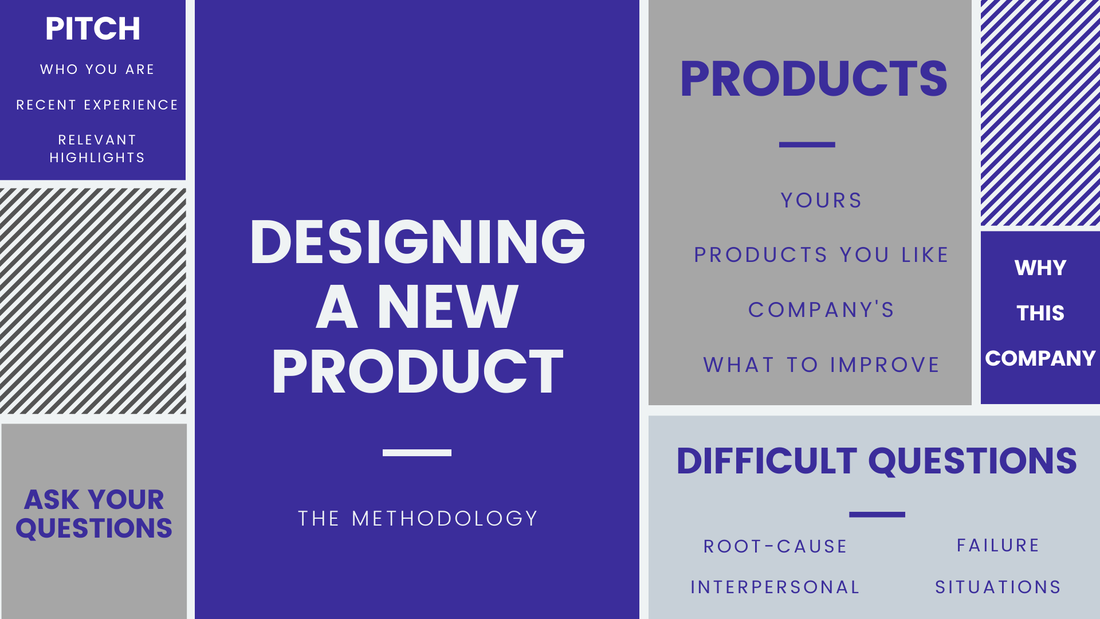
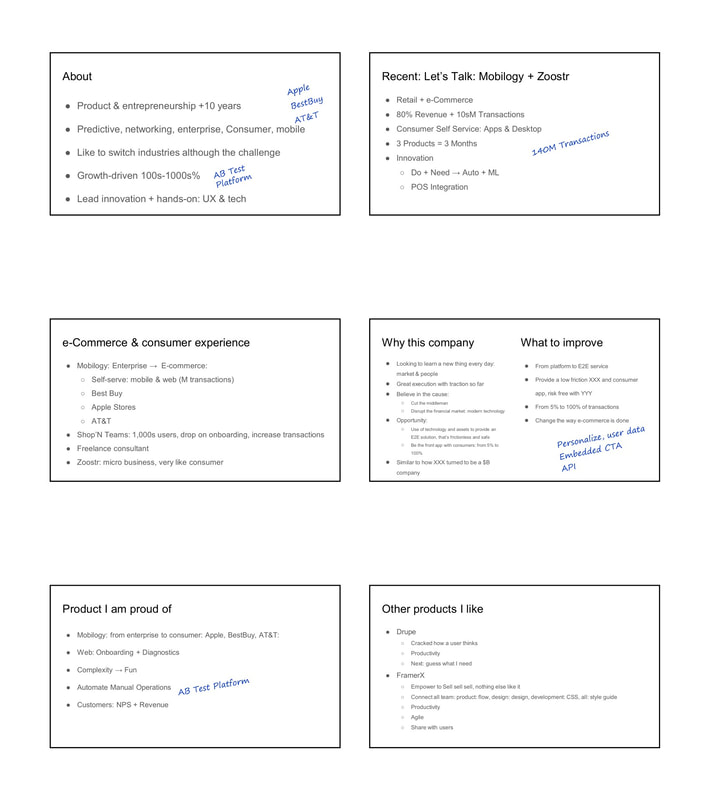
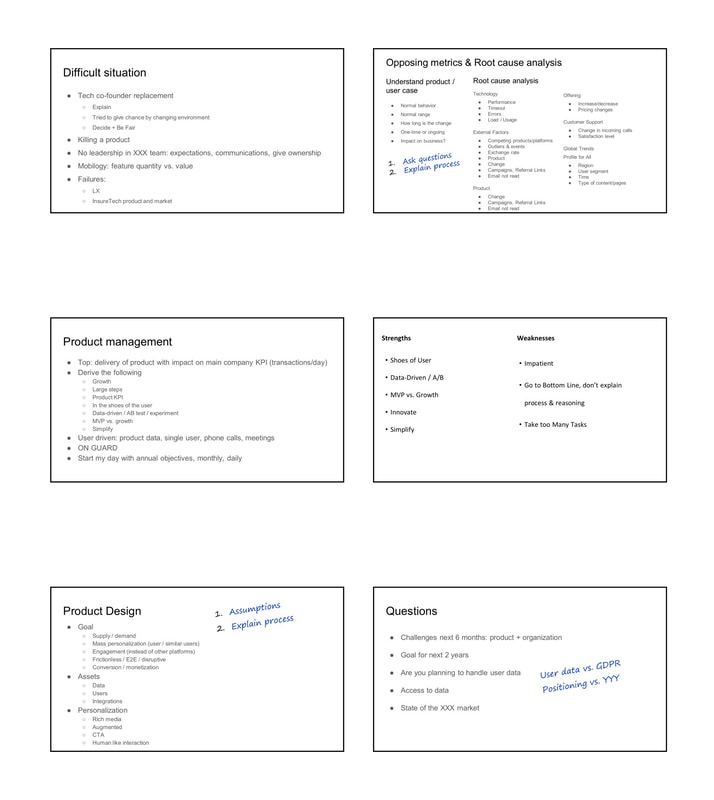
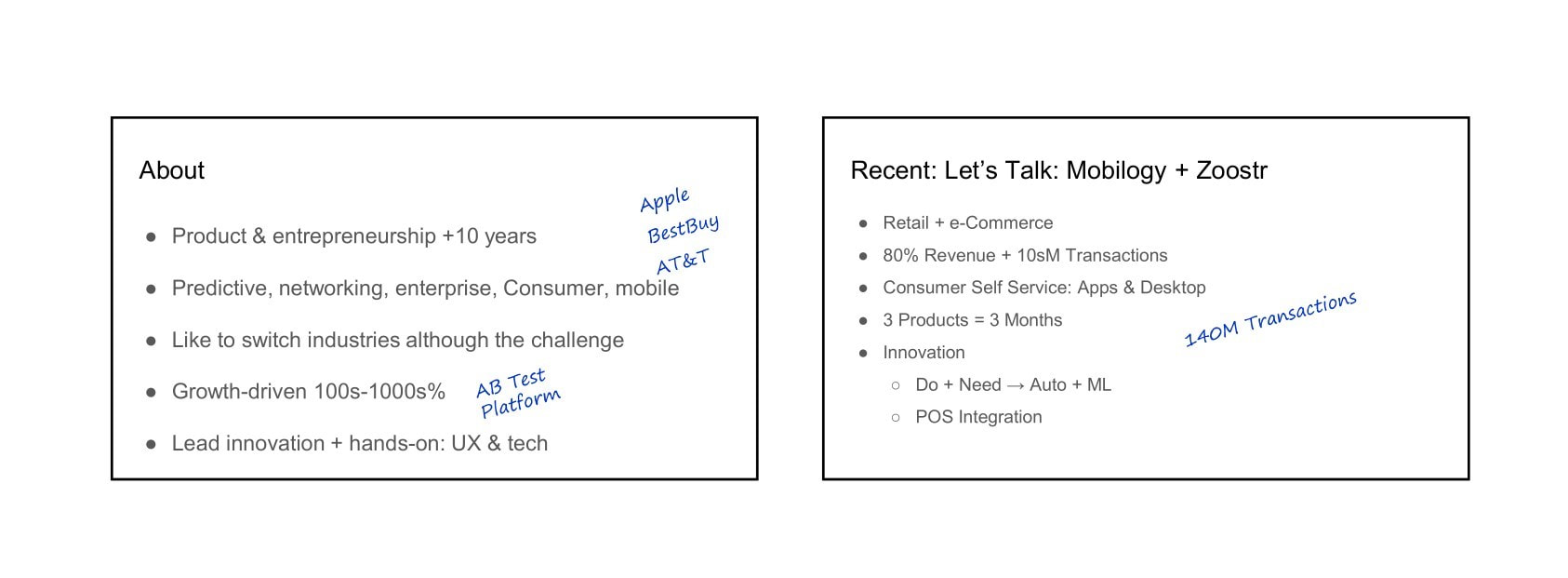
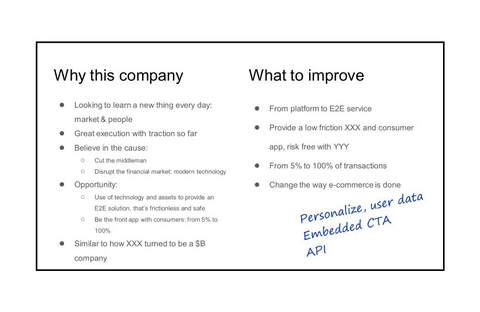
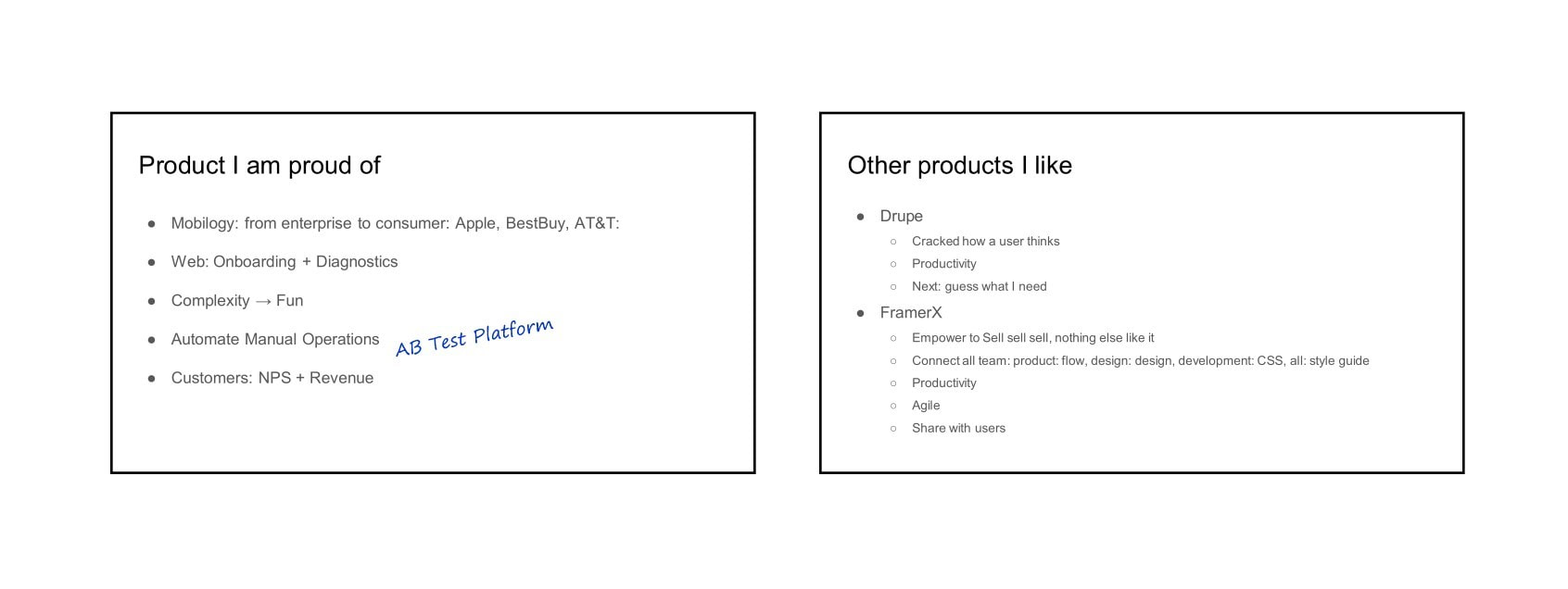
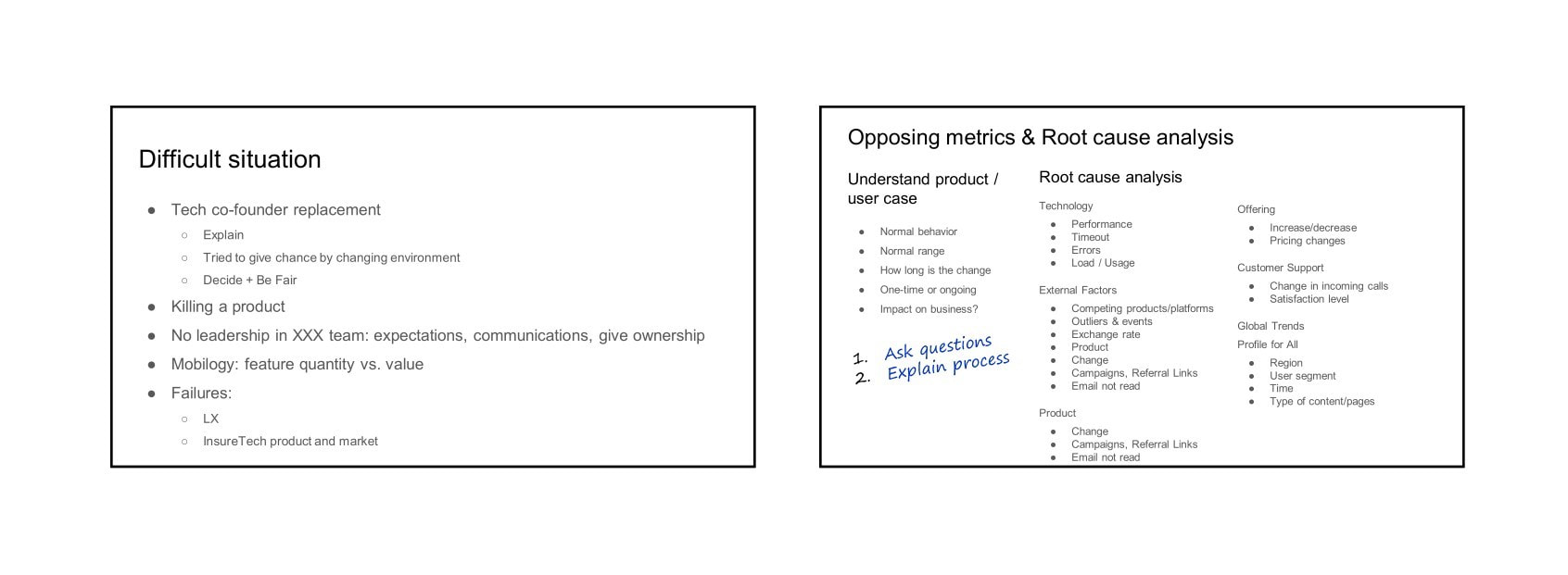
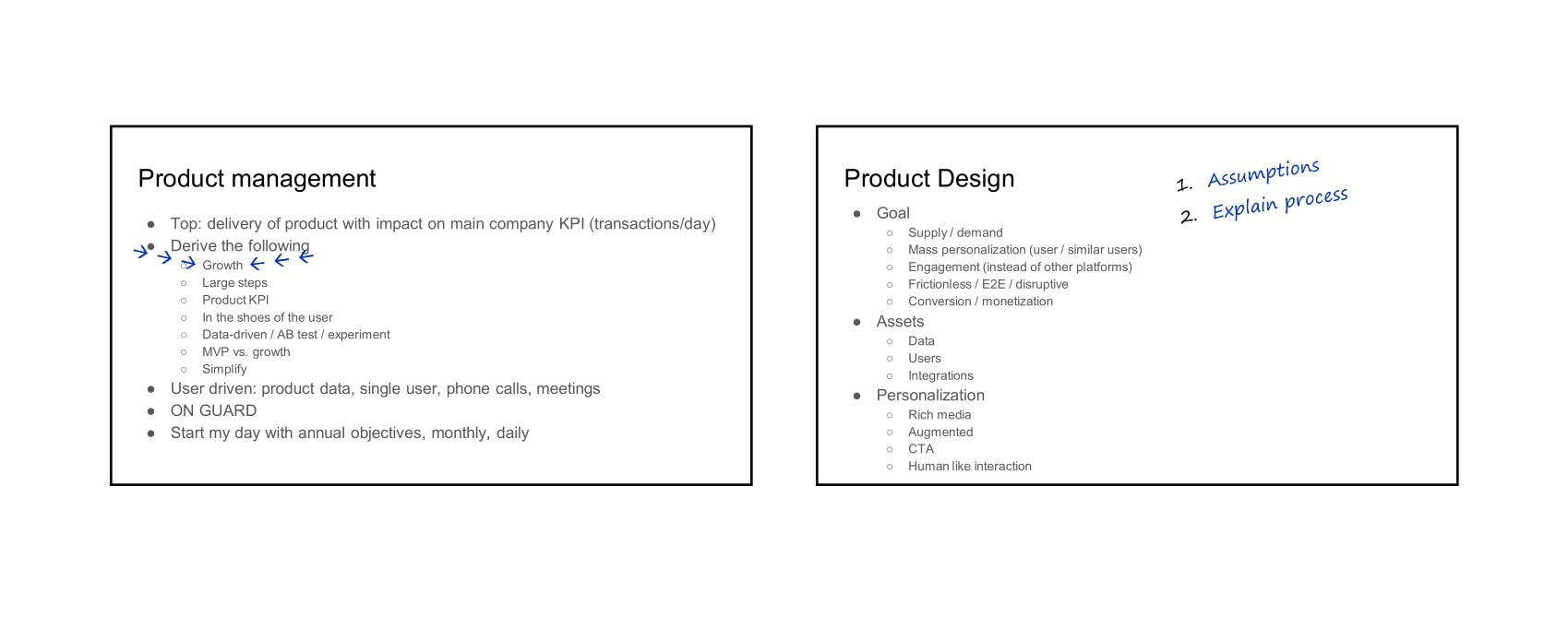
 RSS Feed
RSS Feed